like,likes的使用及巩固练习
动词第三人称单数的变化规则及练习
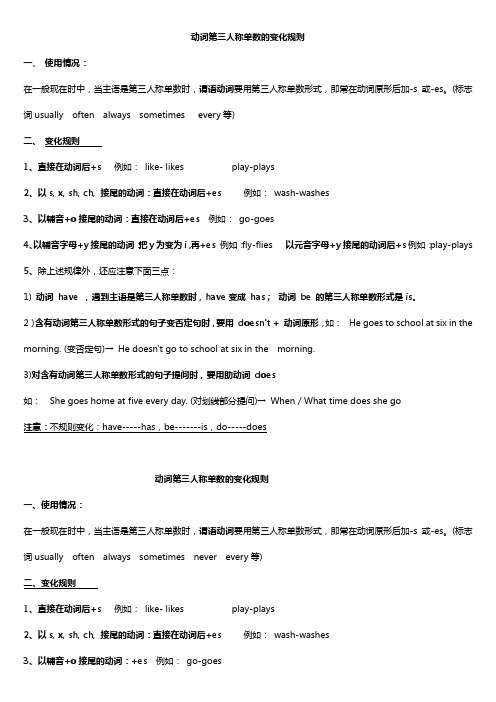
动词第三人称单数的变化规则一、使用情况:在一般现在时中,当主语是第三人称单数时,谓语动词要用第三人称单数形式,即常在动词原形后加-s或-es。
(标志词usually often always sometimes every等)二、变化规则1、直接在动词后+s 例如:like- likes play-plays2、以s, x, sh, ch, 接尾的动词:直接在动词后+es 例如:wash-washes3、以辅音+o接尾的动词:直接在动词后+es 例如:go-goes4、以辅音字母+y接尾的动词:把y为变为i,再+es 例如:fly-flies 以元音字母+y接尾的动词后+s例如:play-plays5、除上述规律外,还应注意下面三点:1)动词have ,遇到主语是第三人称单数时,have变成has;动词be 的第三人称单数形式是is。
2)含有动词第三人称单数形式的句子变否定句时,要用doesn't + 动词原形,如:He goes to school at six in the morning. (变否定句)→He doesn't go to school at six in the morning.3)对含有动词第三人称单数形式的句子提问时,要用助动词does如:She goes home at five every day. (对划线部分提问)→When / What time does she go注意:不规则变化:have-----has,be-------is,do-----does动词第三人称单数的变化规则一、使用情况:在一般现在时中,当主语是第三人称单数时,谓语动词要用第三人称单数形式,即常在动词原形后加-s或-es。
(标志词usually often always sometimes never every等)二、变化规则1、直接在动词后+s 例如:like- likes play-plays2、以s, x, sh, ch, 接尾的动词:直接在动词后+es 例如:wash-washes3、以辅音+o接尾的动词:+es 例如:go-goes4、以辅音字母+y接尾的动词:把y变为i,再+es 例如:fly-flies 以元音字母+y接尾的动词后+s例如:play-plays5、除上述规律外,还应注意下面三点:1)动词have ,遇到主语是第三人称单数时,have变成has;动词be 的第三人称单数形式是is。
likes后面加什么形式的动词
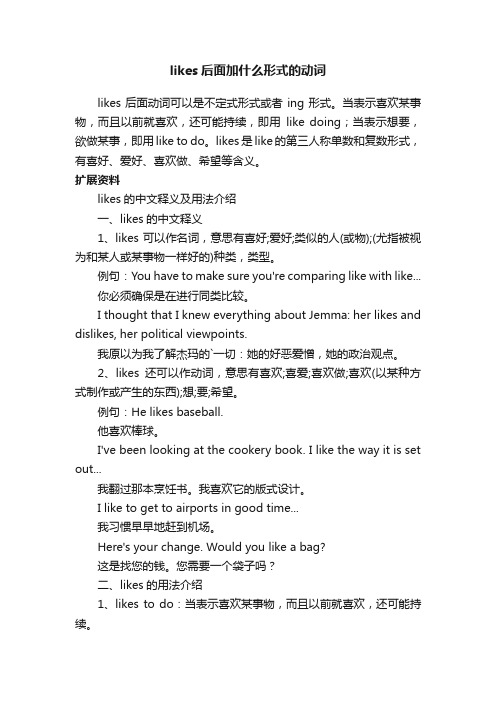
likes后面加什么形式的动词likes后面动词可以是不定式形式或者ing形式。
当表示喜欢某事物,而且以前就喜欢,还可能持续,即用like doing;当表示想要,欲做某事,即用like to do。
likes是like的第三人称单数和复数形式,有喜好、爱好、喜欢做、希望等含义。
扩展资料likes的中文释义及用法介绍一、likes的中文释义1、likes可以作名词,意思有喜好;爱好;类似的人(或物);(尤指被视为和某人或某事物一样好的)种类,类型。
例句:You have to make sure you're comparing like with like...你必须确保是在进行同类比较。
I thought that I knew everything about Jemma: her likes and dislikes, her political viewpoints.我原以为我了解杰玛的`一切:她的好恶爱憎,她的政治观点。
2、likes还可以作动词,意思有喜欢;喜爱;喜欢做;喜欢(以某种方式制作或产生的东西);想;要;希望。
例句:He likes baseball.他喜欢棒球。
I've been looking at the cookery book. I like the way it is set out...我翻过那本烹饪书。
我喜欢它的版式设计。
I like to get to airports in good time...我习惯早早地赶到机场。
Here's your change. Would you like a bag?这是找您的钱。
您需要一个袋子吗?二、likes的用法介绍1、likes to do:当表示喜欢某事物,而且以前就喜欢,还可能持续。
例句:He likes cooking in his house. 他喜欢在家做饭吃。
2、likes doing:当表示想要,欲做某事。
like,likes的使用及巩固练习
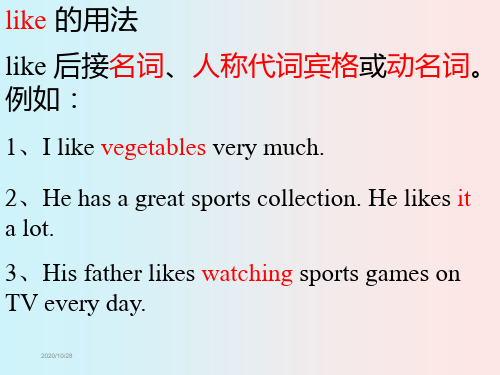
4. My good friend likes apples and oranges. (对划线部分提问) 5. His family like vegetables very much. (对划线部分提问)
1、Do Emma and Paul like salad? No, they don’t.
2、My grandparents don’t have many nice pictures. 3、Does yours, he does. 4、What does your good friend like?
5、What do his family like very much? 2020/10/28
1、She and I don’t go to the same school. 2、We don’t do our homework every day. 3、Sam doesn’t go to school by bike. 4、He doesn’t run fast. 5、Jim doesn’t draw well. 6、Gina doesn’t dance with her classmates every afternoon. 7、Anna doesn’t eat well. 8、Sa20l2l0/y10/2d8 oesn’t do spots after school with her cousin.
归纳:like的一般疑问形式是Do…like…? 2020/10/28 likes的一般疑问形式是Does…like…?
1、I like vegetables very much. What do you like very much?
2、We like our teacher. Who do you like?
Like 用法归纳和练习题
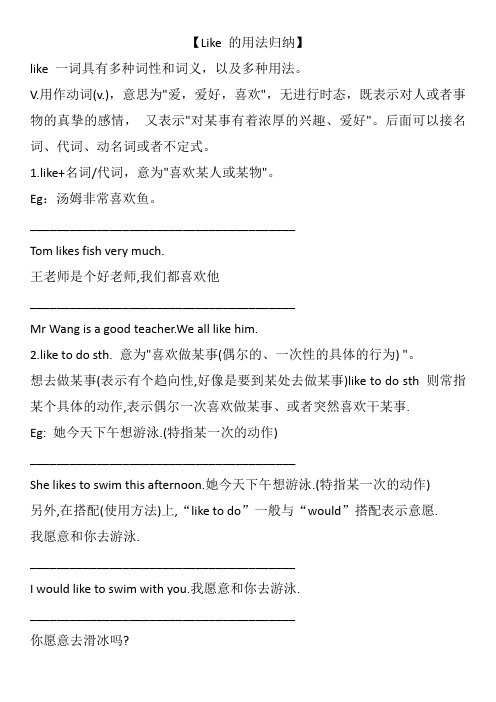
【Like 的用法归纳】like 一词具有多种词性和词义,以及多种用法。
V.用作动词(v.),意思为"爱,爱好,喜欢",无进行时态,既表示对人或者事物的真挚的感情,又表示"对某事有着浓厚的兴趣、爱好"。
后面可以接名词、代词、动名词或者不定式。
1.like+名词/代词,意为"喜欢某人或某物"。
Eg:汤姆非常喜欢鱼。
________________________________________Tom likes fish very much.王老师是个好老师,我们都喜欢他________________________________________Mr Wang is a good teacher.We all like him.2.like to do sth. 意为"喜欢做某事(偶尔的、一次性的具体的行为) "。
想去做某事(表示有个趋向性,好像是要到某处去做某事)like to do sth 则常指某个具体的动作,表示偶尔一次喜欢做某事、或者突然喜欢干某事.Eg: 她今天下午想游泳.(特指某一次的动作)________________________________________She likes to swim this afternoon.她今天下午想游泳.(特指某一次的动作)另外,在搭配(使用方法)上,“like to do”一般与“would”搭配表示意愿.我愿意和你去游泳.________________________________________I would like to swim with you.我愿意和你去游泳.________________________________________你愿意去滑冰吗?________________________________________Would you like to skate.今天太热了,我想去游泳。
动词第三人称单数的变化规则及练习
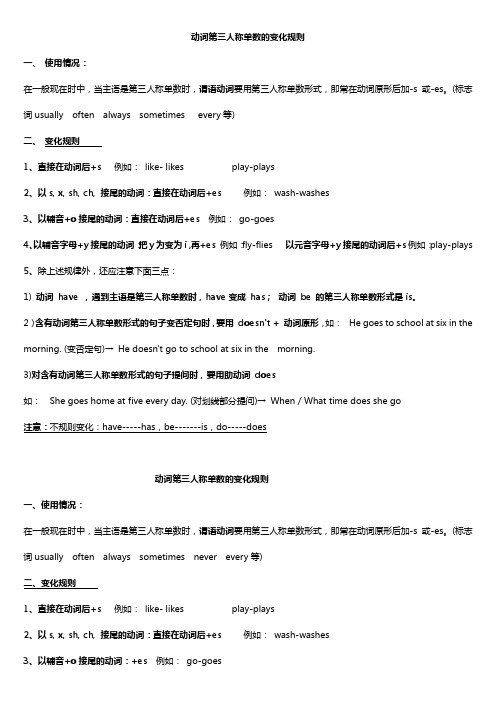
动词第三人称单数的变化规则一、使用情况:在一般现在时中,当主语是第三人称单数时,谓语动词要用第三人称单数形式,即常在动词原形后加-s或-es。
(标志词usually often always sometimes every等)二、变化规则1、直接在动词后+s 例如:like- likes play-plays2、以s, x, sh, ch, 接尾的动词:直接在动词后+es 例如:wash-washes3、以辅音+o接尾的动词:直接在动词后+es 例如:go-goes4、以辅音字母+y接尾的动词:把y为变为i,再+es 例如:fly-flies 以元音字母+y接尾的动词后+s例如:play-plays5、除上述规律外,还应注意下面三点:1)动词have ,遇到主语是第三人称单数时,have变成has;动词be 的第三人称单数形式是is。
2)含有动词第三人称单数形式的句子变否定句时,要用doesn't + 动词原形,如:He goes to school at six in the morning. (变否定句)→He doesn't go to school at six in the morning.3)对含有动词第三人称单数形式的句子提问时,要用助动词does如:She goes home at five every day. (对划线部分提问)→When / What time does she go注意:不规则变化:have-----has,be-------is,do-----does动词第三人称单数的变化规则一、使用情况:在一般现在时中,当主语是第三人称单数时,谓语动词要用第三人称单数形式,即常在动词原形后加-s或-es。
(标志词usually often always sometimes never every等)二、变化规则1、直接在动词后+s 例如:like- likes play-plays2、以s, x, sh, ch, 接尾的动词:直接在动词后+es 例如:wash-washes3、以辅音+o接尾的动词:+es 例如:go-goes4、以辅音字母+y接尾的动词:把y变为i,再+es 例如:fly-flies 以元音字母+y接尾的动词后+s例如:play-plays5、除上述规律外,还应注意下面三点:1)动词have ,遇到主语是第三人称单数时,have变成has;动词be 的第三人称单数形式是is。
Like和likes的用法likes的用法
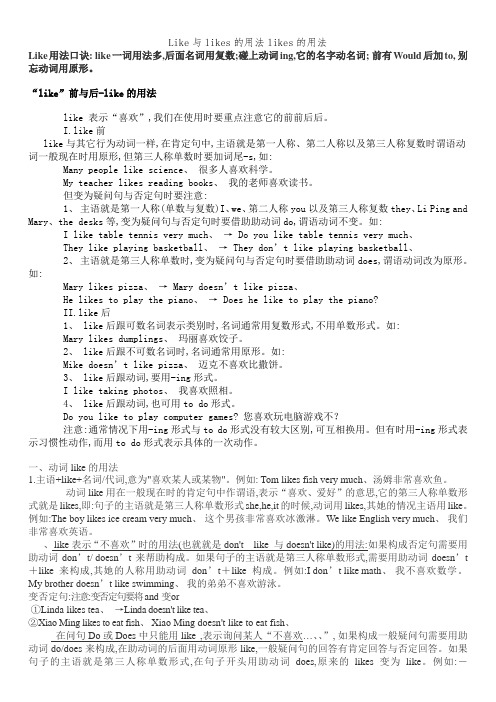
Like用法口诀: like一词用法多,后面名词用复数;碰上动词ing,它的名字动名词; 前有Would后加to, 别忘动词用原形。
“like”前与后-like的用法like 表示“喜欢”,我们在使用时要重点注意它的前前后后。
I.like前like与其它行为动词一样,在肯定句中,主语就是第一人称、第二人称以及第三人称复数时谓语动词一般现在时用原形,但第三人称单数时要加词尾-s,如:Many people like science、很多人喜欢科学。
My teacher likes reading books、我的老师喜欢读书。
但变为疑问句与否定句时要注意:1、主语就是第一人称(单数与复数)I、we、第二人称you以及第三人称复数they、Li Ping and Mary、the desks等,变为疑问句与否定句时要借助助动词do,谓语动词不变。
如:I like table tennis very much、→ Do you like table tennis very much、They like playing basketball、→ They don’t like playing basketball、2、主语就是第三人称单数时,变为疑问句与否定句时要借助助动词does,谓语动词改为原形。
如:Mary likes pizza、→ Mary doesn’t like pizza、He likes to play the piano、→ Does he like to play the piano?II.like后1、 like后跟可数名词表示类别时,名词通常用复数形式,不用单数形式。
如:Mary likes dumplings、玛丽喜欢饺子。
2、 like后跟不可数名词时,名词通常用原形。
如:Mike doesn’t like pizza、迈克不喜欢比撒饼。
3、 like后跟动词,要用-ing形式。
Like和likes的用法讲课稿
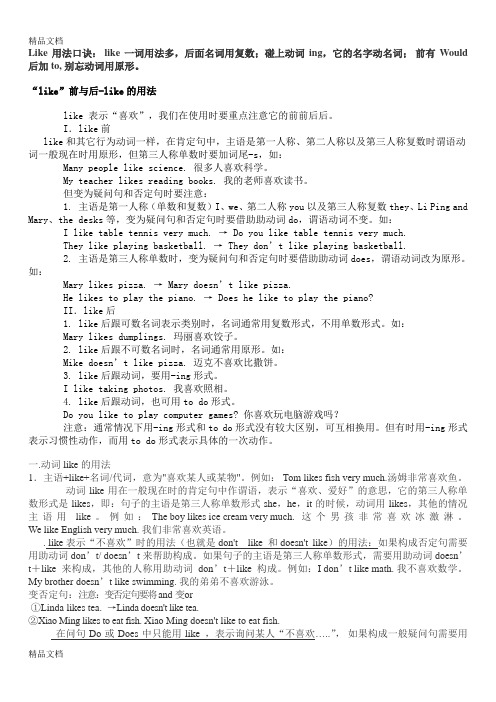
Like用法口诀: like一词用法多,后面名词用复数;碰上动词ing,它的名字动名词;前有Would 后加to, 别忘动词用原形。
“like”前与后-like的用法like 表示“喜欢”,我们在使用时要重点注意它的前前后后。
I.like前like和其它行为动词一样,在肯定句中,主语是第一人称、第二人称以及第三人称复数时谓语动词一般现在时用原形,但第三人称单数时要加词尾-s,如:Many people like science. 很多人喜欢科学。
My teacher likes reading books. 我的老师喜欢读书。
但变为疑问句和否定句时要注意:1. 主语是第一人称(单数和复数)I、we、第二人称you以及第三人称复数they、Li Ping and Mary、the desks等,变为疑问句和否定句时要借助助动词do,谓语动词不变。
如:I like table tennis very much. → Do you like table tennis very much.They like playing basketball. → They don’t like playing basketball.2. 主语是第三人称单数时,变为疑问句和否定句时要借助助动词does,谓语动词改为原形。
如:Mary likes pizza. → Mary doesn’t like pizza.He likes to play the piano. → Does he like to play the piano?II.like后1. like后跟可数名词表示类别时,名词通常用复数形式,不用单数形式。
如:Mary likes dumplings. 玛丽喜欢饺子。
2. like后跟不可数名词时,名词通常用原形。
如:Mike doesn’t like pizza. 迈克不喜欢比撒饼。
3. like后跟动词,要用-ing形式。
Like和likes的用法
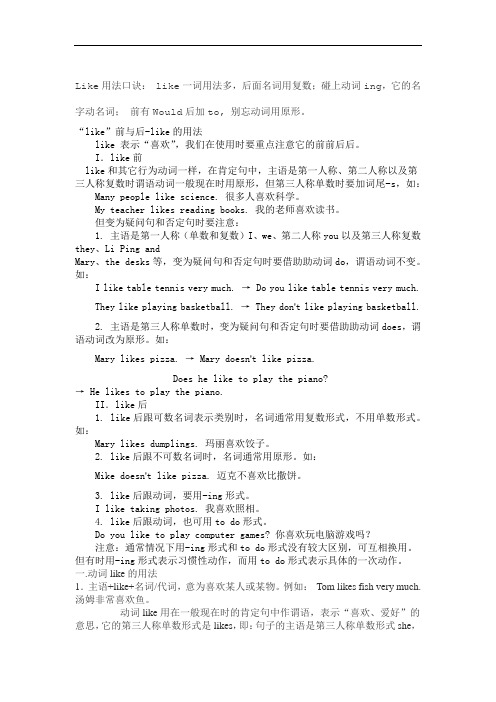
Like用法口诀: like一词用法多,后面名词用复数;碰上动词ing,它的名字动名词;前有Would后加to, 别忘动词用原形。
“like”前与后-like的用法like 表示“喜欢”,我们在使用时要重点注意它的前前后后。
I.like前like和其它行为动词一样,在肯定句中,主语是第一人称、第二人称以及第三人称复数时谓语动词一般现在时用原形,但第三人称单数时要加词尾-s,如: Many people like science. 很多人喜欢科学。
My teacher likes reading books. 我的老师喜欢读书。
但变为疑问句和否定句时要注意:1. 主语是第一人称(单数和复数)I、we、第二人称you以及第三人称复数they、Li Ping andMary、the desks等,变为疑问句和否定句时要借助助动词do,谓语动词不变。
如:I like table tennis very much. → Do you like table tennis very much.They like playing basketball. → They don't like playing basketball.2. 主语是第三人称单数时,变为疑问句和否定句时要借助助动词does,谓语动词改为原形。
如:Mary likes pizza. → Mary doesn't like pizza.Does he like to play the piano?→ He likes to play the piano.II.like后1. like后跟可数名词表示类别时,名词通常用复数形式,不用单数形式。
如:Mary likes dumplings. 玛丽喜欢饺子。
2. like后跟不可数名词时,名词通常用原形。
如:Mike doesn't like pizza. 迈克不喜欢比撒饼。
3. like后跟动词,要用-ing形式。
人教版小学英语like专项讲解及专项练习题
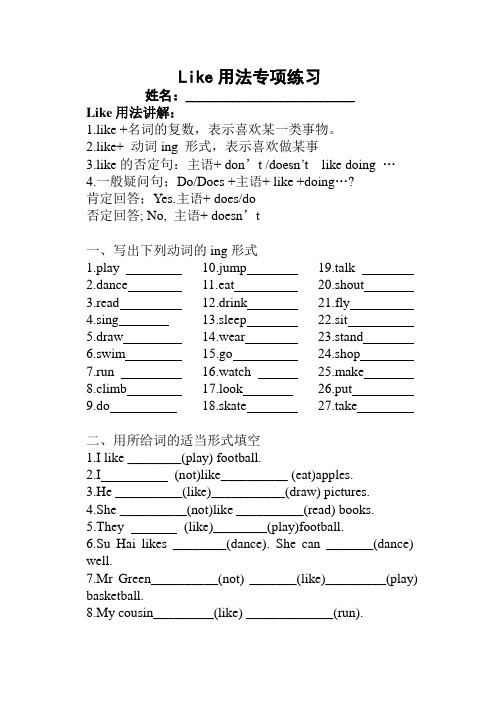
Like用法专项练习姓名:_________________________Like用法讲解:1.like +名词的复数,表示喜欢某一类事物。
2.like+ 动词ing 形式,表示喜欢做某事3.like的否定句:主语+ don’t /doesn’t like doing …4.一般疑问句;Do/Does +主语+ like +doing…?肯定回答;Yes.主语+ does/do否定回答; No, 主语+ doesn’t一、写出下列动词的ing形式1.play2.dance3.read4.sing5.draw6.swim7.run8.climb9.do 10.jump11.eat12.drink13.sleep14.wear15.go16.watch17.look18.skate19.talk20.shout21.fly22.sit23.stand24.shop25.make26.put27.take二、用所给词的适当形式填空1.I like ________(play) football.2.I (not)like__________ (eat)apples.3.He __________(like)___________(draw) pictures.4.She __________(not)like __________(read) books.5.They (like)________(play)football.6.Su Hai likes ________(dance). She can _______(dance) well.7.Mr Green__________(not) _______(like)_________(play) basketball.8.My cousin_________(like) _____________(run).9.My father _________(like)___________(watch) films and ________(sing)10. (do)you (like) (skate)? No,I .11. (do)she______(like) (dance)?Yes,she12.__________(do) he like ____________(listen) to music? No, he ____________.13. (do)my sister (like) (sing)? No, she14. (do)they____(like) (swim)? Yes, they15._________he like ___________(play) the piano?Yes, he __________.16._____Yang Ling_______(like)_______(play) ping-pong? Yes.she _______.18.What __________(do) you ______(like) _________(do)?I like swimming.What __________(do) she ______(like) _________(do)? She likes swimming.19.The girl ________(like) red flowers, but the boy __________(not like)______(they).The girls________(like) red flowers, but the boys_________(not like )______(they).20.I like ________(skate),but I can not (skate) well.21.Do you like _________(rabbit) ? No,I ___________.22..Bobby __________(can not) see any cakes in the fridge.23.You can ________(eat) some bread.24.They can _______(swim).25.She can ________(run) and _______(jump).26.It can ________(talk) and _______(fly).27.He can ______( play) basketball,but his sister ____(not).28.What can you _______(do)? I can ________(sing).29.Can you find Tom? No, I __________.30.What can she_____(do)?She can dance.三、句型转换1.Mike likes drawing in the park.改为否定句:________________________________________________ 改为一般疑问句:________________________________________________ 对划线部分提问:________________________________________________ 2.I like cats.改为否定句:________________________________________________ 改为一般疑问句,并作肯定回答:________________________________________________ 对划线部分提问:________________________________________________ 3.SuYang likes playing the piano .改为一般疑问句:________________________________________________ 对划线部分提问:________________________________________________ 4.LiuTao and Mike like listening to music and drawing.对划线部分提问:_______________________________________________ 改为一般疑问句并作肯定回答:______________________________________________5.We like swimming in summer.改为一般疑问句:________________________________________________ 对划线部分提问:________________________________________________ 改为否定句:________________________________________________ 6.My brother likes singing.改为否定句:________________________________________________ 改为一般疑问句:________________________________________________ 对划线部分提问:________________________________________________ 7.I can see some juice in the glass.改为否定句:________________________________________________ 改为一般疑问句,并作肯定回答:________________________________________________ 对划线部分提问:________________________________________________ 8.He can play the piano well.改为一般疑问句,并作否定回答:________________________________________________ 9.Can I go to school today?作肯定回答:________________________________________________改为肯定句:________________________________________________。
小学英语like练习题
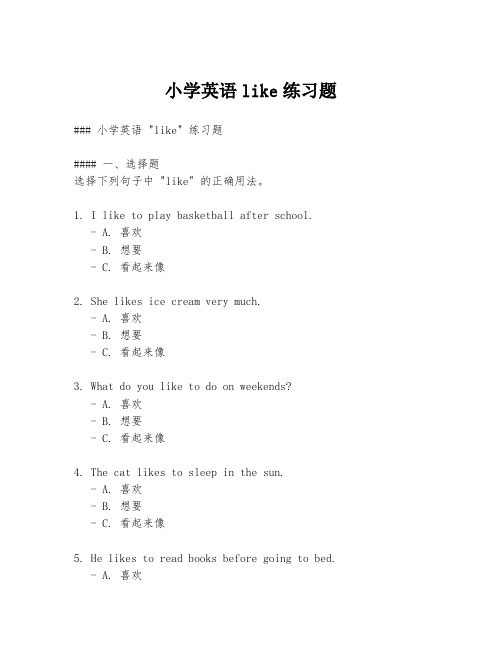
小学英语like练习题### 小学英语 "like" 练习题#### 一、选择题选择下列句子中 "like" 的正确用法。
1. I like to play basketball after school.- A. 喜欢- B. 想要- C. 看起来像2. She likes ice cream very much.- A. 喜欢- B. 想要- C. 看起来像3. What do you like to do on weekends?- A. 喜欢- B. 想要- C. 看起来像4. The cat likes to sleep in the sun.- A. 喜欢- B. 想要- C. 看起来像5. He likes to read books before going to bed. - A. 喜欢- B. 想要- C. 看起来像#### 二、填空题根据句子的意思,在空白处填入 "like" 的正确形式。
6. My brother and I both _____ (喜欢) playing soccer.7. My mother _____ (喜欢) cooking for us.8. I _____ (喜欢) to watch movies on Friday nights.9. _____ (你喜欢) to go to the park with me?10. She _____ (喜欢) listening to music while doing homework.#### 三、翻译题将下列句子翻译成英文,并注意 "like" 的正确用法。
11. 我非常喜欢游泳。
12. 他喜欢在公园里散步。
13. 你想要和我一起去图书馆吗?14. 她喜欢在晚上阅读。
15. 我们喜欢在周末去爬山。
#### 四、连词成句使用给定的单词,按照正确的语法规则,组成含有 "like" 的句子。
like likes重点讲解
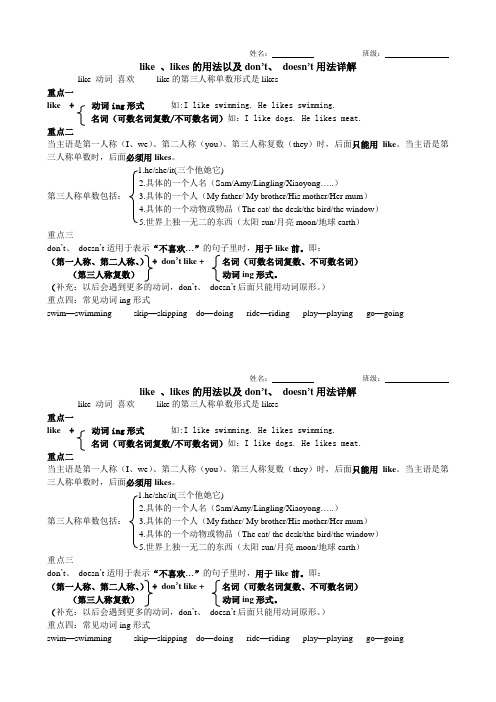
姓名:班级:like 、likes的用法以及don’t、doesn’t用法详解like 动词喜欢like的第三人称单数形式是likes重点一like + 动词ing形式如:I like swimming. He likes swimming.名词(可数名词复数/不可数名词)如:I like dogs. He likes meat.重点二当主语是第一人称(I、we)、第二人称(you)、第三人称复数(they)时,后面只能用like。
当主语是第三人称单数时,后面必须用likes。
1.he/she/it(三个他她它)2.具体的一个人名(Sam/Amy/Lingling/Xiaoyong…..)第三人称单数包括: 3.具体的一个人(My father/ My brother/His mother/Her mum)4.具体的一个动物或物品(The cat/ the desk/the bird/the window)5.世界上独一无二的东西(太阳sun/月亮moon/地球earth)重点三don’t、doesn’t适用于表示“不喜欢…”的句子里时,用于like前。
即:(第一人称、第二人称、) + don’t like + 名词(可数名词复数、不可数名词)(第三人称复数)动词ing形式。
(补充:以后会遇到更多的动词,don’t、doesn’t后面只能用动词原形。
)重点四:常见动词ing形式swim—swimming skip—skipping do—doing ride—riding play—playing go—going姓名:班级:like 、likes的用法以及don’t、doesn’t用法详解like 动词喜欢like的第三人称单数形式是likes重点一like + 动词ing形式如:I like swimming. He likes swimming.名词(可数名词复数/不可数名词)如:I like dogs. He likes meat.重点二当主语是第一人称(I、we)、第二人称(you)、第三人称复数(they)时,后面只能用like。
【英语知识点】like和likes的区别和用法
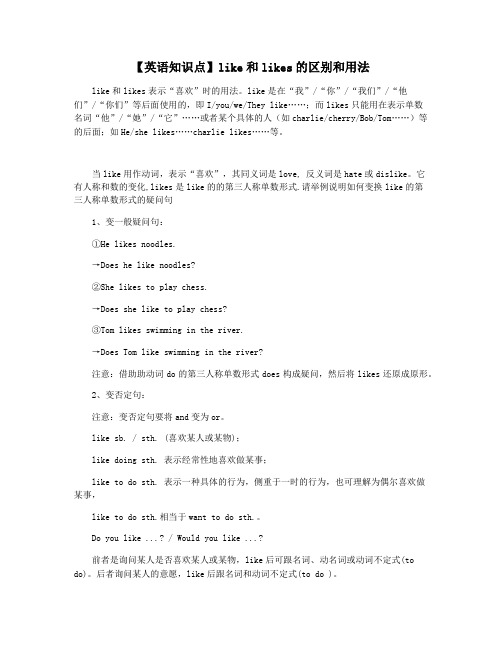
【英语知识点】like和likes的区别和用法like和likes表示“喜欢”时的用法。
like是在“我”/“你”/“我们”/“他们”/“你们”等后面使用的,即I/you/we/They like……;而likes只能用在表示单数名词“他”/“她”/“它”……或者某个具体的人(如charlie/cherry/Bob/Tom……)等的后面;如He/she likes……charlie likes……等。
当like用作动词,表示“喜欢”,其同义词是love, 反义词是hate或dislike。
它有人称和数的变化,likes是like的的第三人称单数形式.请举例说明如何变换like的第三人称单数形式的疑问句1、变一般疑问句:①He likes noodles.→Does he like noodles?②She likes to play chess.→Does she like to play chess?③Tom likes swimmi ng in the river.→Does Tom like swimming in the river?注意:借助助动词do的第三人称单数形式does构成疑问,然后将likes还原成原形。
2、变否定句:注意:变否定句要将and变为or。
like sb. / sth. (喜欢某人或某物);like doing sth. 表示经常性地喜欢做某事;like to do sth. 表示一种具体的行为,侧重于一时的行为,也可理解为偶尔喜欢做某事,like to do sth.相当于want to do sth.。
Do you like ...? / Would you like ...?前者是询问某人是否喜欢某人或某物,like后可跟名词、动名词或动词不定式(to do)。
后者询问某人的意愿,like后跟名词和动词不定式(to do )。
B.“像”like 一词也作介词like 用作介词,意为“像……”,“跟……一样”,不能单独作谓语,在句子中一般作状语或表语。
like的用法练习题
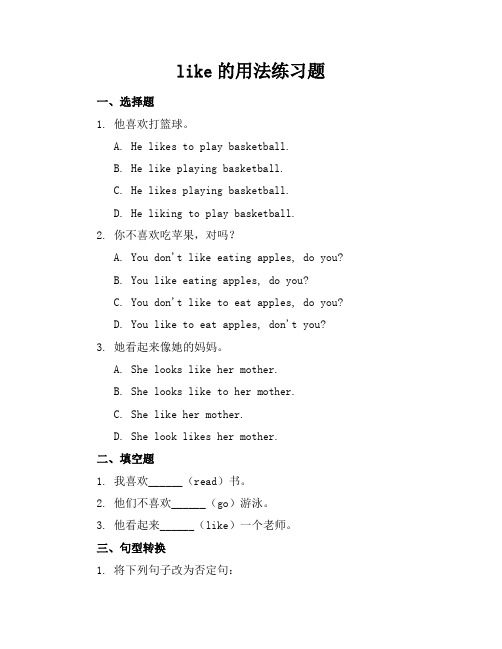
like的用法练习题一、选择题1. 他喜欢打篮球。
A. He likes to play basketball.B. He like playing basketball.C. He likes playing basketball.D. He liking to play basketball.2. 你不喜欢吃苹果,对吗?A. You don't like eating apples, do you?B. You like eating apples, do you?C. You don't like to eat apples, do you?D. You like to eat apples, don't you?3. 她看起来像她的妈妈。
A. She looks like her mother.B. She looks like to her mother.C. She like her mother.D. She look likes her mother.二、填空题1. 我喜欢______(read)书。
2. 他们不喜欢______(go)游泳。
3. 他看起来______(like)一个老师。
三、句型转换1. 将下列句子改为否定句:He likes playing football.She likes to eat ice cream.2. 将下列句子改为疑问句:They like watching movies.You like listening to music.四、翻译题1. 他喜欢在周末去公园散步。
2. 他们不喜欢吃辛辣的食物。
3. 你喜欢哪个季节?五、完形填空A. likes; doing; likes; look likeB. like; do; like; looks likeC. likes; do; likes; look likeD. like; doing; likes; looks like六、阅读理解John is a middle school student. He has many hobbies. He likes playing basketball, reading books and listening to music. But he doesn't like eating vegetables. His best friend, Mike, is different from him. Mike likes eating vegetables and he doesn't like playing sports. They both like studyingEnglish and they want to be translators in the future.Answer the following questions:1. What are John's hobbies?2. What does John not like?3. What does Mike like?七、匹配题请将左栏的动词与右栏的名词搭配,形成正确的短语。
likes名词
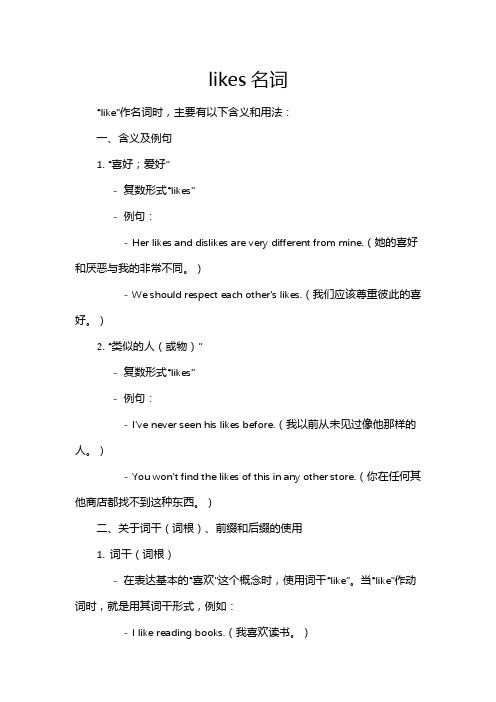
likes名词“like”作名词时,主要有以下含义和用法:一、含义及例句1. “喜好;爱好”- 复数形式“likes”- 例句:- Her likes and dislikes are very different from mine.(她的喜好和厌恶与我的非常不同。
)- We should respect each other's likes.(我们应该尊重彼此的喜好。
)2. “类似的人(或物)”- 复数形式“likes”- 例句:- I've never seen his likes before.(我以前从未见过像他那样的人。
)- You won't find the likes of this in any other store.(你在任何其他商店都找不到这种东西。
)二、关于词干(词根)、前缀和后缀的使用1. 词干(词根)- 在表达基本的“喜欢”这个概念时,使用词干“like”。
当“like”作动词时,就是用其词干形式,例如:- I like reading books.(我喜欢读书。
)- 这里直接用“like”表示一种动作或状态,不需要添加前缀或后缀来表达这个基本意义。
2. 后缀- 当表示“喜好”这个名词概念时,加后缀“ -s”变为复数形式“likes”来表示多个喜好或者多个类似的人或物,如前面所举的名词例句中的用法。
- 还有形容词“likely”(可能的),是在“like”词干的基础上加后缀“ -ly”,例如:- It is likely to rain tomorrow.(明天可能会下雨。
)- 一般来说,在需要改变词性(如从动词变为名词、形容词等)或者表达复数概念时,会添加后缀。
3. 前缀- 在英语中,“like”很少通过加前缀来改变其意义,但有一些相关的词如“dislike”(不喜欢),这里的“dis -”是前缀,表示否定意义。
- 例句:- She dislikes spicy food.(她不喜欢辛辣的食物。
like的用法练习题
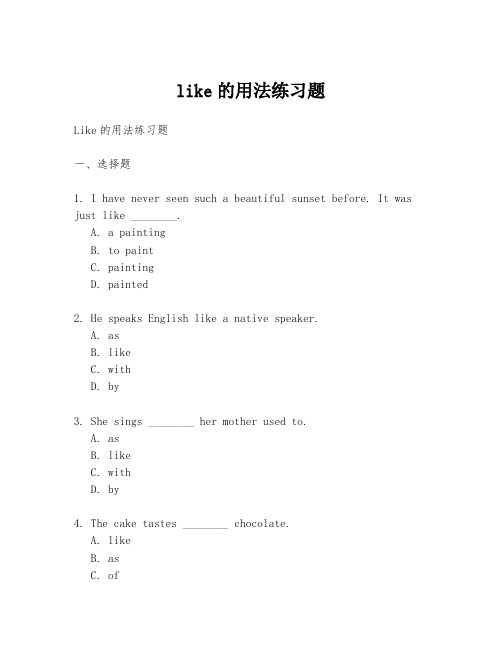
like的用法练习题Like的用法练习题一、选择题1. I have never seen such a beautiful sunset before. It was just like ________.A. a paintingB. to paintC. paintingD. painted2. He speaks English like a native speaker.A. asB. likeC. withD. by3. She sings ________ her mother used to.A. asB. likeC. withD. by4. The cake tastes ________ chocolate.A. likeB. asC. ofD. to5. He acts ________ he knows everything.A. as ifB. likeC. as thoughD. as二、填空题6. She walks ________ she owns the place.7. The story was ________ a fairy tale.8. He looks ________ he is lost in thought.9. The room was ________ a mess after the party.10. She dances ________ a professional.三、改错题11. He talks like he is the boss of the company.- 错误:like- 正确:as if12. The baby looks like he is hungry.- 错误:like- 正确:as if13. She swims as a fish in the water.- 错误:as- 正确:like14. The sound of the rain is like music to my ears.- 错误:like- 正确:as15. He behaves like he doesn't care about anything.- 错误:无- 正确:无四、翻译题16. 她说话的样子好像她很懂这个话题。
Unit3Do,Does,Like,Likes专项练习.doc
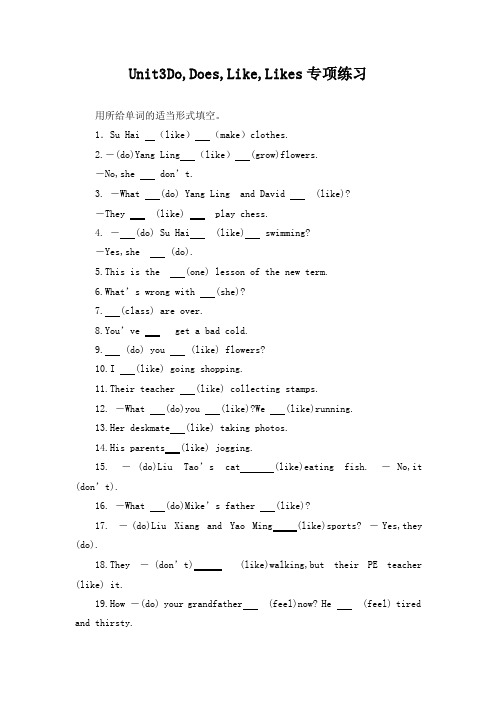
Unit3Do,Does,Like,Likes专项练习用所给单词的适当形式填空。
1.Su Hai (like)(make)clothes.2.-(do)Yang Ling (like) (grow)flowers.-No,she don’t.3. -What (do) Yang Ling and David (like)?-They (like) play chess.4. - (do) Su Hai (like) swimming?-Yes,she (do).5.This is the (one) lesson of the new term.6.What’s wrong with (she)?7. (class) are over.8.You’ve get a bad cold.9. (do) you (like) flowers?10.I (like) going shopping.11.Their teacher (like) collecting stamps.12. -What (do)you (like)?We (like)running.13.Her deskmate (like) taking photos.14.His parents (like) jogging.15. -(do)Liu Tao’s cat (like)eating fish. -No,it (don’t).16. -What (do)Mike’s father (like)?17. -(do)Liu Xiang and Yao Ming (like)sports? -Yes,they (do).18.They -(don’t) (like)walking,but their PE teacher (like) it.19.How -(do) your grandfather (feel)now? He (feel) tiredand thirsty.20.Can you (cook)nice food?Yes,I like (cook).21. (Do) you have any new subjects this term?No,Helen (have) two new subjectsthis term.22.-How many lessons (do)Mike (have)a week? -About thirty.23. He (have) got a high fever,he (need) some rest.24. Su Hai (don’t) (like)taking any medicine.25.You can (get) some fruit for them.26.Her brother (like )showing his things to his friend.27. - (Do)your father and mother (have )the same hobby?-No,they (don’t).28. - (Do)you (have) a Chinese pen friend?-No,I (don’t),but Nancy (don’t),she (have) a Chinese pen friend.29.My hobby is writing an E-mail,my classmates (like ) surfing the Internet.30. - (Do)you (feel)ill?-No,I feel fine.But she is (feel)ill.。
like语法练习
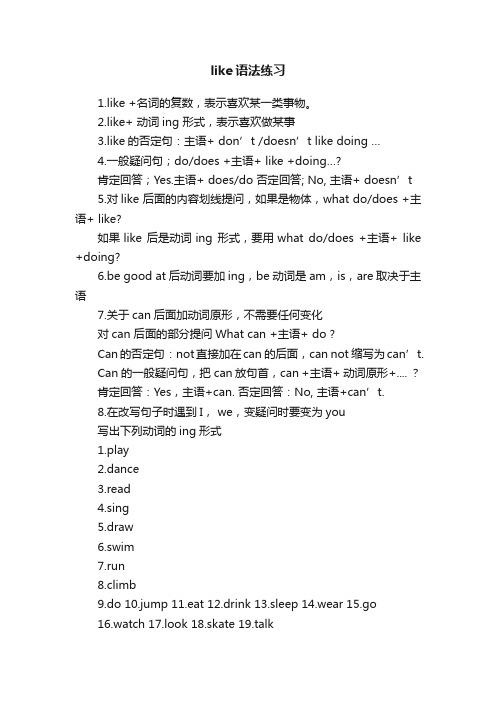
like语法练习1.like +名词的复数,表示喜欢某一类事物。
2.like+ 动词ing 形式,表示喜欢做某事3.like的否定句:主语+ don’t /doesn’t like doing …4.一般疑问句;do/does +主语+ like +doing…?肯定回答;Yes.主语+ does/do 否定回答; No, 主语+ doesn’t5.对like 后面的内容划线提问,如果是物体,what do/does +主语+ like?如果like 后是动词ing 形式,要用what do/does +主语+ like +doing?6.be good at后动词要加ing,be动词是am,is,are取决于主语7.关于can后面加动词原形,不需要任何变化对can 后面的部分提问What can +主语+ do ?Can的否定句:not直接加在can 的后面,can not 缩写为can’t.Can的一般疑问句,把can 放句首,can +主语+ 动词原形+.... ?肯定回答:Yes,主语+can. 否定回答:No, 主语+can’t.8.在改写句子时遇到I, we,变疑问时要变为you写出下列动词的ing形式1.play2.dance3.read4.sing5.draw6.swim7.run8.climb9.do 10.jump 11.eat 12.drink 13.sleep 14.wear 15.go16.watch 17.look 18.skate 19.talk20.shout21.fly 22.sit 23.stand 24.shop 25.make 写出下列动词的第三人称单数形式(加s/es或部分特殊单词去掉y加ies)1.like2.play3.carry4.read5.have/doc/a1c47c21f80f76c66137ee06eff9aef89 41e48b2.html e7.go8.watch9.do 10.sing用所给词的适当形式填空1.I like ________(play) football.2.I (not)like (eat)apples.3.He __________(like)___________(draw) pictures.4.She __________(not)like __________(read) _________books.5.They (like) (play)football.6.Su Hai likes ________(dance). She can _______(dance) well.7.Mr Green__________(not) _______(like)_________(play) basketball.8.My cousin_________(like) _____________(run).9.My father _________(like)___________(watch) flims and ________(sing)10. (do)you (like) (skate)? No,I .11. (do)she (like) (dance)? Yes,she .12.__________(do) he like ________(listen) to music? No,he____________.13. (do)my sister (like) (sing)?No,she .14. (do)they (like) (swim)?Yes,they .15._________he like ___________(play) the piano? Yes,he __________.16.________Yang Ling_______(like)_______(play) table tennis? Yes.she _______.18.What __________(do) you ______(like) _________(do)? I like swimming.What __________(do) she ______(like) _________(do)?She likes swimming.19.The girl ________(like) red flowers,but the boy __________(not like)______(they).The girls________(like) red flowers,but the boys_________(notlike)____ __(they).20.I like ________(skate),but I can not (skate) well.21.Do you like _________(rabbit) ? No,I ___________.22..Bobby __________(can not) see any cakes in the fridge.23.You can ________(eat) some bread.24.They can _______(swim).25.She can ________(run) and _______(jump).26.It can ________(talk) and _______(fly).27.He can ______( play) basketball,but his sister __________(not).28.What can you _______(do)? I can ________(sing).29.Can you find Tom? No, I __________.30.What can she (do)?She can dance.句型转换1.Mike likes drawing in the park.否定句_______________________ ________________一般疑问句___________________________________对划线部分提问_______________________________2.I like cats.否定句_______________________________________一般疑问句,并作肯定回答________________________________________ 对划线部分提问________________________________________3.Su Yang likes playing the piano .一般疑问句_________________________________________________对划线部分提问_____________________________________________4.Liu Tao and Mike like listening to music and drawing.对划线部分提问_______________________________________________ 一般疑问句并作肯定回答______________________________________________ 5.We like swimming in summer.一般疑问句________________________________________________对划线部分提问______________________________________________ 否定句_____________________________________________________6.My brother likes singing.否定句_______________________________一般疑问句____________________________________对划线部分提问______________________________________7.I can see some juice in the glass.否定句;___________________________________一般疑问句,并作肯定回答______________________________________________ 对划线部分提问______________________________________________________ 8.He can play the piano well.一般疑问句,并作否定回答____________________________________________ 9.Can I go to school today?肯定回答:__________________________________改为肯定句__________________________________。
like 用法专项练习
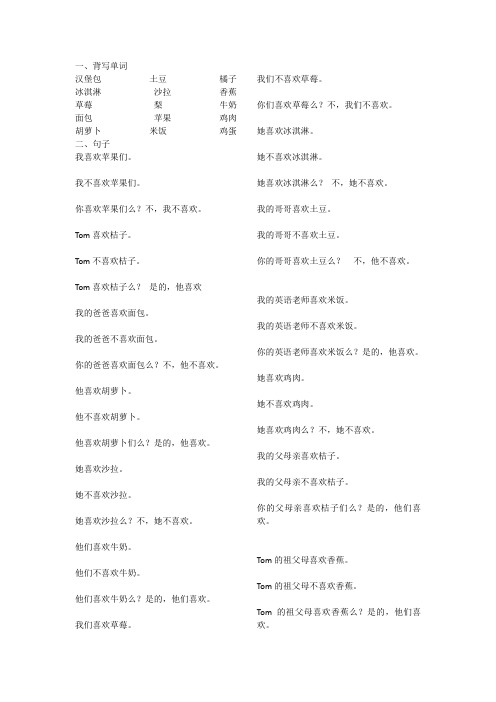
一、背写单词
汉堡包土豆橘子冰淇淋沙拉香蕉草莓梨牛奶面包苹果鸡肉胡萝卜米饭鸡蛋二、句子
我喜欢苹果们。
我不喜欢苹果们。
你喜欢苹果们么?不,我不喜欢。
Tom喜欢桔子。
Tom不喜欢桔子。
Tom喜欢桔子么?是的,他喜欢
我的爸爸喜欢面包。
我的爸爸不喜欢面包。
你的爸爸喜欢面包么?不,他不喜欢。
他喜欢胡萝卜。
他不喜欢胡萝卜。
他喜欢胡萝卜们么?是的,他喜欢。
她喜欢沙拉。
她不喜欢沙拉。
她喜欢沙拉么?不,她不喜欢。
他们喜欢牛奶。
他们不喜欢牛奶。
他们喜欢牛奶么?是的,他们喜欢。
我们喜欢草莓。
我们不喜欢草莓。
你们喜欢草莓么?不,我们不喜欢。
她喜欢冰淇淋。
她不喜欢冰淇淋。
她喜欢冰淇淋么?不,她不喜欢。
我的哥哥喜欢土豆。
我的哥哥不喜欢土豆。
你的哥哥喜欢土豆么?不,他不喜欢。
我的英语老师喜欢米饭。
我的英语老师不喜欢米饭。
你的英语老师喜欢米饭么?是的,他喜欢。
她喜欢鸡肉。
她不喜欢鸡肉。
她喜欢鸡肉么?不,她不喜欢。
我的父母亲喜欢桔子。
我的父母亲不喜欢桔子。
你的父母亲喜欢桔子们么?是的,他们喜欢。
Tom的祖父母喜欢香蕉。
Tom的祖父母不喜欢香蕉。
Tom的祖父母喜欢香蕉么?是的,他们喜欢。
- 1、下载文档前请自行甄别文档内容的完整性,平台不提供额外的编辑、内容补充、找答案等附加服务。
- 2、"仅部分预览"的文档,不可在线预览部分如存在完整性等问题,可反馈申请退款(可完整预览的文档不适用该条件!)。
- 3、如文档侵犯您的权益,请联系客服反馈,我们会尽快为您处理(人工客服工作时间:9:00-18:30)。
1、I like vegetables very much. Do you like vegetables very much? 2、We like our teacher. Do you like your teacher? 3、His father likes watching sports games on TV every day. Does his father like watching sports games on TV every day? 归纳:like的一般疑问形式是Do…like…? likes的一般疑问形式是Does…like…?
拓展练习:将下列各句变为否定句。 1、She and I go to the same school. 2、We do our homework every day. 3、Sam goes to school by bike. 4、He runs fast. 5、Jim draws well. 6、Gina dances with her classmates every afternoon. 7、Anna eats well. 8、Sally does spots after school with her cousin. 1、She and I don’t go to the same school. 2、We don’t do our homework every day. 3、Sam doesn’t go to school by bike. 4、He doesn’t run fast. 5、Jim doesn’t draw well. 6、Gina doesn’t dance with her classmates every afternoon. 7、Anna doesn’t eat well. 8、Sally doesn’t do spots after school with her cousin.
肯定回答) 4. My good friend likes apples and oranges. (对划线部分提问) 5. His family like vegetables very much. (对划线部分提问)
1、Do Emma and Paul like salad? No, they don’t. 2、My grandparents don’t have many nice pictures. 3、Does your uncle like hamburgers for lunch? Yes, he does. 4、What does your good friend like? 5、What do his family like very much?
句型转换
1. Emma and Paul like salad. (改一般疑问句,并做否定回答) 2. My grandparents have many nice pictures. (改否定句) 3. My uncle likes hamburgers for lunch. (改一般疑问句,并做
1、I like vegetables very much. What do you like very much? 2、We like our teacher. Who do you like? 3、His father likes watching sports games on TV every day. What does his father like on TV every day?
1、I like vegetables very much. I don’t like vegetables very much. 2、We like our teacher. We don’t like our teacher. 3、His father likes watching sports games on TV every day. His father doesn’t like watching sports games on TV every day. 归纳:like的否定形式是don’t like; likes的否定形式是doesn’t like。
1.I _____ like running. 2.She and her friend _____ like playing sports after school.
3.Liu Xiang _____ likes singing.
4.David ______ likes playing games with his children after work.
5.Tiger Woods _____ likes playing golf.
6.Pandas ______ like eating bamboo leaves. 7.Tigers don’t ______ like eating bamboo leaves, they _____ like eating meat. 8.Cats ______sleeping in the day and catching mice at night. like
9.I _____watching TV, but my sister _____watching a play. like likes
10.Sally ______ likes telling stories, but she doesn't _____ like wearing the school uniforms.
like 的用法
like 后接名词、人称代词宾格或动名词。 例如:
1、I like vegetables very much. 2、He has a great sports collection. He likes it a lot. 3、His father likes watching sports games on TV every day.
